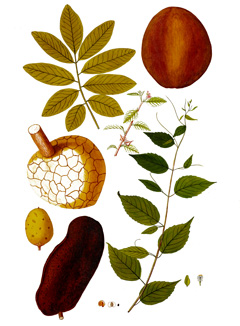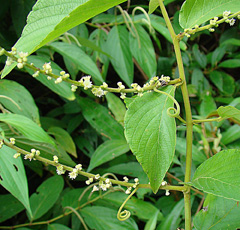 |
|
www.edibleplants.org |
 |
| Dick Culbert - wikimedia.org |
Translate this page:
Summary
Gouania lupuloides or commonly known as Chew Stick is a shrub with arching branches of up to 12 m long. It can be found in Central America particularly in Panama to Mexico, and the Caribbean. The stems are bitter and aromatic and have been used as a substitute for hops in brewing beer. Also, it is often chewed to clean the teeth and harden the gums. In Yucatan, root decoction is used as a gargle for sores in the mouth and throat. Stem infusion is used for gonorrhea and dropsy.
Physical Characteristics

 Gouania lupuloides is a CLIMBER growing to 10 m (32ft) by 0.3 m (1ft in) at a medium rate.
Gouania lupuloides is a CLIMBER growing to 10 m (32ft) by 0.3 m (1ft in) at a medium rate.
See above for USDA hardiness. It is hardy to UK zone 10. The flowers are pollinated by Insects.
Suitable for: light (sandy), medium (loamy) and heavy (clay) soils and prefers well-drained soil. Suitable pH: mildly acid, neutral and basic (mildly alkaline) soils. It cannot grow in the shade. It prefers moist soil and can tolerate drought.
UK Hardiness Map
US Hardiness Map
Synonyms
Banisteria lupuloides L. Gouania domingensis L. Gouania glabra Jacq. Lupulus lupuloides (L.) Kuntze
Plant Habitats
Edible Uses
Edible Parts: Stem
Edible Uses: Drink
The aromatic, bitter stems have been used as a substitute for hops in brewing beer[301 , 331 ]. They are used to add flavour and body to a range of drinks including soda, ginger beer, root beer and root tonics[301 ]. This is a very agreeable bitter. It is used as a substitute for hops in ginger beer, and cool drinks[346 ].
References More on Edible Uses
Medicinal Uses
Plants For A Future can not take any responsibility for any adverse effects from the use of plants. Always seek advice from a professional before using a plant medicinally.
Bitter Mouthwash
A decoction of the root is used in Yucatan as a gargle for sores in the mouth and throat[331 ]. An infusion (of the stem?) has been employed in the treatment of gonorrhoea and dropsy, and as a light grateful bitter, in cases of debility, to restore the tone of the stomach[346 ].
References More on Medicinal Uses
The Bookshop: Edible Plant Books
Our Latest books on Perennial Plants For Food Forests and Permaculture Gardens in paperback or digital formats.

Edible Tropical Plants
Food Forest Plants for Hotter Conditions: 250+ Plants For Tropical Food Forests & Permaculture Gardens.
More

Edible Temperate Plants
Plants for Your Food Forest: 500 Plants for Temperate Food Forests & Permaculture Gardens.
More

More Books
PFAF have eight books available in paperback and digital formats. Browse the shop for more information.
Shop Now
Other Uses
Teeth
Other Uses: The stems of this and other species probably contain saponin, and when they are chewed large quantities of lather are produced. The stems are often chewed to clean the teeth and harden the gums[46 , 331 ]. A piece of a branch, about as thick as the little finger, is softened by chewing, and then rubbed against the teeth. In this manner a tooth-brush, and, with it, a powder are obtained, equal, if not superior, to any in use in Europe[346 ]. When powdered, the stem forms an excellent dentifrice; its aromatic bitter producing a healthy state of the gums, and the mucilage it contains working up by the brush into a kind of soap-like froth[346 ].
Special Uses
References More on Other Uses
Cultivation details
A tropical plant. The flowers are much frequented by bees[331 ].
References Carbon Farming Information and Carbon Sequestration Information
Temperature Converter
Type a value in the Celsius field to convert the value to Fahrenheit:
Fahrenheit:
The PFAF Bookshop
Plants For A Future have a number of books available in paperback and digital form. Book titles include Edible Plants, Edible Perennials, Edible Trees,Edible Shrubs, Woodland Gardening, and Temperate Food Forest Plants. Our new book is Food Forest Plants For Hotter Conditions (Tropical and Sub-Tropical).
Shop Now
Plant Propagation
Seed
Other Names
If available other names are mentioned here
Chaw-stick, Chewstick,
Native Range
NORTHERN AMERICA: Mexico (Chihuahua, Durango, San Luis Potosí, Sinaloa, Tamaulipas, Zacatecas), Mexico (Campeche, Chiapas, Colima, Guerrero, Hidalgo, Jalisco, México, Michoacán de Ocampo, Morelos, Nayarit, Oaxaca, Puebla, Querétaro, Quintana Roo, Tabasco, Veracruz de Ignacio de la Llave, Yucatán) SOUTHERN AMERICA: West Indies, Trinidad and Tobago, Belize, Costa Rica, Guatemala, Honduras, Nicaragua, Panama, El Salvador, Venezuela, Colombia, Ecuador, Peru
Weed Potential
Right plant wrong place. We are currently updating this section.
Please note that a plant may be invasive in one area but may not in your area so it's worth checking.
Conservation Status
IUCN Red List of Threatened Plants Status : This taxon has not yet been assessed

Growth: S = slow M = medium F = fast. Soil: L = light (sandy) M = medium H = heavy (clay). pH: A = acid N = neutral B = basic (alkaline). Shade: F = full shade S = semi-shade N = no shade. Moisture: D = dry M = Moist We = wet Wa = water.
Now available:
Food Forest Plants for Mediterranean Conditions
350+ Perennial Plants For Mediterranean and Drier Food Forests and Permaculture Gardens.
[Paperback and eBook]
This is the third in Plants For A Future's series of plant guides for food forests tailored to
specific climate zones. Following volumes on temperate and tropical ecosystems, this book focuses
on species suited to Mediterranean conditions—regions with hot, dry summers and cool, wet winters,
often facing the added challenge of climate change.
Read More
Expert comment
Author
(L.)Urb.
Botanical References
1
Links / References
For a list of references used on this page please go here
A special thanks to Ken Fern for some of the information used on this page.
Readers comment
| Add a comment |
|
If you have important information about this plant that may help other users please add a comment or link below. Only comments or links that are felt to be directly relevant to a plant will be included. If you think a comment/link or information contained on this page is inaccurate or misleading we would welcome your feedback at [email protected]. If you have questions about a plant please use the Forum on this website as we do not have the resources to answer questions ourselves.
* Please note: the comments by website users are not necessarily those held by PFAF and may give misleading or inaccurate information.
To leave a comment please Register or login here All comments need to be approved so will not appear immediately.
|
Subject : Gouania lupuloides
|
|
|
|